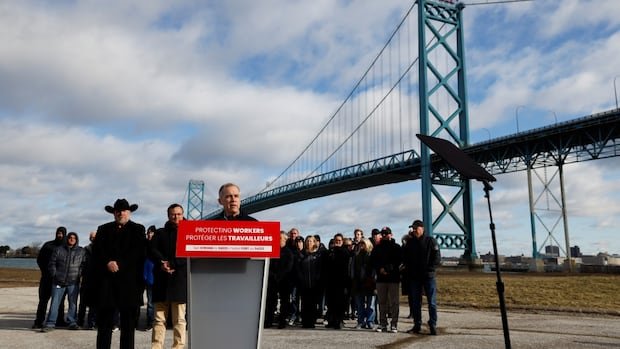Homing in once again on the fractured Canada-U.S. relationship, Liberal Leader Mark Carney unveiled a $2-billion proposal to protect Canada’s auto industry while in Windsor, Ont., on Wednesday — one of the front lines of the tariff war.
Calling it a “strategic response fund,” Carney said the money would be used to boost the auto sector’s competitiveness, protect manufacturing jobs, help workers gain expertise and build “a fortified Canadian supply chain.”
Carney’s announcement came hours before U.S. President Donald Trump ratcheted up the trade war, announcing plans for a 25 per cent tariff on all vehicles not made in the United States as of April 2.
“Our auto sector has always been there for our country. So in this time of uncertainty and need, Canada will be there for our autoworkers,” Carney said Wednesday morning in the shadow of the Ambassador Bridge.
The crossing not only connects Windsor and Michigan, but also helps shuttle millions of dollars worth of goods traded between Canada and the U.S. every day.
Windsor, home to major auto plants like Ford and Stellantis, has become synonymous not just with Canada’s auto industry but also its deeply intertwined trade relationship with the U.S. industry.
Auto parts often cross the border multiple times, and the added costs of tariffs and counter-tariffs would quickly snowball.
Carney called that a “huge vulnerability” and promised to build an “all-in-Canada” manufacturing network to build more car parts domestically, limiting how often they cross the border during production.
“In the new world, that will be an advantage,” he said. “That will help insulate us from President Trump’s trade threats and it will grow the economy.”
If elected April 28, Carney said his government would also prioritize and procure Canadian-built vehicles.
During a Day 4 campaign stop in Windsor, Ont., Liberal Leader Mark Carney announced that if he’s elected prime minister, a $2-billion ‘strategic response fund’ will be created to help workers affected by tariffs imposed by U.S. President Donald Trump. The fund would help create an all-Canadian network for automobile component manufacturing.
Later Wednesday, Trump moved ahead with a potentially devastating blow to Canada’s auto sector — and the Windsor region.
“What we’re going to be doing is a 25 per cent tariff on all cars that are not made in the United States,” Trump announced just before 5:30 p.m. ET.
The president did not immediately suggest that there would be carve outs for imports from Canada or Mexico. He called the tariffs “permanent.”
The president has already imposed 25 per cent tariffs on Canadian steel and aluminum.
“Knock it off,” said Conservative Leader Pierre Poilievre, responding to news of Trump’s impending announcement. He was campaigning in Montmagny, east of Quebec City.
“These tariffs are simply causing chaos in markets. They’re dislocating workers on both sides of the border. Stop threatening Canada with tariffs, stop talking about our sovereignty.”
Carney not keen on resuming trade talks with China
Carney touted trade diversification during his Windsor stop, pointing to his trip to Europe days after he was sworn in as prime minister.
Asked if Canada should reopen free trade talks with China, Carney said he wants to diversify with “like-minded partners.”
“There are partners in Asia with whom we can build deeper ties,” he said. “But the partners in Asia that share our values don’t include China.”
His response comes after China’s ambassador to Canada, Wang Di, recently told reporters that Beijing is open to restarting free trade talks with Canada.
The Liberal government began negotiations with China in 2017 for a possible free trade deal, but the talks sputtered out out after Chinese leaders took issue with Canada’s environmental, gender and labour standards.
Relations between Canada and China plummeted after December 2018 when Beijing detained Canadians Michael Kovrig and Michael Spavor on vague national security allegations. Just last week, China executed four Canadians after convicting them of drug-related offences.
On Tuesday, Poilievre accused the Liberal leader of having held “secret talks” with an official from China’s central bank during Carney’s time leading the Canadian government’s economic task force. The meeting was in fact publicly announced.
Poilievre went on to suggest Carney’s recent position with Brookfield Asset Management, which has a multimillion-dollar loan with the Bank of China, should raise national security concerns. Carney resigned as chair of the board to run for the Liberal leadership earlier this year.
“What did Mr. Carney, in his role as Trudeau’s economic adviser, offer to China?” Poilievre asked.
Carney denied the accusation he’s beholden to China.
“China happens to be our second-largest trading partner,” he said Wednesday. “We’ve got to understand where China is, where China’s going, whether there’s any room for partnership in that.”
He called Poilievre a “conspiracy theorist” who “spends too much time with his MAGA friends.”






